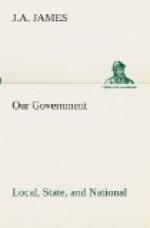The Control of Commerce.—The power over commerce, which we are next to discuss, was given to Congress because the history of the country under the Articles of Confederation showed clearly that State control of commerce resulted in confusion and constant disputes. It is necessary that merchants and ship-owners should conduct their business under laws that are as uniform as possible. It is also necessary that they should be certain as to the terms of the law. These conditions could not exist if each State were to make laws controlling the commerce going to other States and to foreign countries.
The Constitution gives Congress the power, in Article I, Section 8, Clause 3, To regulate commerce with foreign nations, and among the several States, and with the Indian tribes. Not all commerce that is carried on by the citizens of this country is subject to control by Congress.
There is a vast amount of commerce that is carried on entirely within the limits of the different States. Over this commerce Congress has no power; it is regulated by State laws relating to trade and transportation.
Interstate Commerce.—The distinction between State and interstate commerce is not readily seen in many cases; but in general it may be said that if a commodity starts in one State destined for another, its control throughout its course lies within the power of Congress. This principle applies to both land and water transportation. So the coast trade among the States lies within the jurisdiction of Congress; also, commerce upon those rivers that form highways between different States. The harbors and waterways of the United States have been improved by the expenditure of many millions of dollars. This money has been appropriated in the “River and Harbor Bills” that are passed by almost every Congress.
The Interstate Commerce Law.—The importance of railroad transportation led to the enactment, in 1887, of the “Interstate Commerce Law,” controlling this form of commerce. The law became necessary because of certain abuses which had arisen. In many instances the railroads gave lower freight rates to certain persons than to others doing the same kind of business; again, the merchants or manufacturers of certain cities were favored by more liberal rates than could be obtained by those who were engaged in the same industries in other cities. As a result, the business of many persons and places suffered injury, while the business of their rivals prospered through the advantages given to them by the railroads.
In consequence of these and other evils, various laws, beginning with that of 1887, have been passed to control not only railroad and steamboat lines, but also telegraph, telephone, express, and sleeping-car companies in so far as they are engaged in interstate and foreign commerce.




